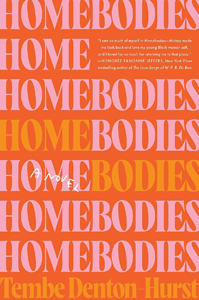Art affirms life in Tembe Denton-Hurst’s debut novel “Homebodies” (2023), about a magazine writer who is fired due to subtle office politics only to find her lowest moment might be the impetus for a career breakthrough. For the author, obviously a stand-in for main character Mickey, the breakthrough is the novel itself.
For Mickey, the breakthrough could be a prominent place in the public discourse about a topical yet hard-to-explain issue: the way Black women can be hot commodities in a workplace yet are kept from gaining too much power.
A raw description of “Homebodies’ ” plot makes it sound like millennial P.C. whining, but Mickey’s job experiences are universal and the overall novel has a lot to say about a variety of issues. It’s not a coming-of-age story, as Mickey is in her 20s.

“Homebodies” (2023)
Author: Tembe Denton-Hurst
Genres: Family, relationship and career drama
Settings: New York City and Maryland, 2023
Note to readers: The Book Club Book Report series features books I’m reading for my book club, Brilliant Bookworms.
But it’s a smoothly written, decompressed (but not in a bad way) coming-of-career story that is OK with the fact that people might find their identity and purpose later than the traditional milestone ages of 18 or 21. It’s set in the modern era of extended adolescence, and this is a given in the novel. Mickey deals with anxiety, depression, ennui and even self-sabotage; she swings from high to low based on open or subtle treatment by people who matter to her.
She is outraged by her firing – and the subsequent appropriation of her rejected story pitch into a successful story for her replacement – but also wonders if her former employer was right. Maybe she is simply not good enough. Mickey bears her scorned soul in a scathing open letter and posts it to Twitter, then wonders if she’s a selfish whiner – especially when the “likes” don’t pour in.
Social media matters (for better or worse)
“Homebodies” is an extraordinarily modern novel, giving weight to social media that it has (perhaps unfortunately) achieved in today’s culture. While Mickey does occasionally get fresh air and recognize the cityscapes around her – New York, where she lives with girlfriend Lex; and the Maryland part of the DMV area, her hometown that she returns to – she is indeed a homebody.
Without making a positive or negative judgment, Denton-Hurst shows Mickey spending a lot of time on social media, gauging her level of popularity at the moment. Mickey’s relationships with Lex and former (perhaps rekindled) hometown flame Tee often play out in heavy texting or, conversely, the silent treatment of ignored texts and unacknowledged calls.
Like her personal life, Mickey’s career is defined by the speed and manner of communication with potential readers. Her job is to quickly pounce on trends and produce fast-hitting articles in volume more so than depth – but also with an eye to the long-form feature that goes viral. It’s about clicks, but with an eye to maintaining your brand’s respectability.

On another level, Mickey must build herself as a brand while also serving the needs of her employer – something that might be incompatible. While Denton-Hurst is writing about her own experiences, unavoidably through lenses of “Black,” “female” and “gay,” the universality of office politics comes through.
Often the losers in this game fail to pass the personality test, and Denton-Hurst is open in portraying how Mickey does not make great first impressions and relies on letting her work (rather than her voice) speak for her. White, male and straight people who aren’t great at the social game – like me – can relate to Mickey.
It goes beyond the popular categories
So while “Homebodies” will be categorized as Black, women’s and LGBT fiction because everything must be labeled, Denton-Hurst threads a needle. The novel addresses what it’s like for Mickey to be in those talking-point categories but also the less-acknowledge category of introverts.
The author shows this in Mickey’s conversations with strangers and in structured interactions, such as the meeting with HR about her dismissal. And also by the fact that she has a handful of these close confidantes but lacks the thousands of casual “friends” that are key to popularity. She loves deeply but not widely (and not superficially), to her social and career detriment.
While Mickey is a victim in a narrative sense, her own imperfections are acknowledged on nearly every page. These range from her insecurities about being a “big” girl to something that’s never totally reconciled – the fact that she leans heavily on partner Lex’s generosity of emotional and practical support.
Mickey’s actions are often unkind toward Lex and others (her grandmother, her dad, her friends) who care for her. An outward image of Mickey will not be universally beloved at every moment. But because we’re on the inside with her, we see she has a good heart; she tries to balance her own desires with being good to those she loves. Sometimes she is simply tired; who can’t sympathize with that?
The fact that she doesn’t always succeed gives “Homebodies” honesty and depth. It’s a self-centered, likely autobiographical debut novel that was easy for me to like in part because Mickey is not likeable at every moment.

